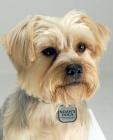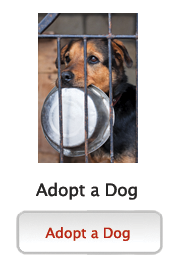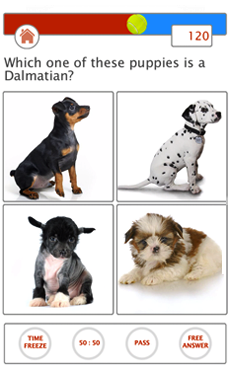Yorkshire Terrier
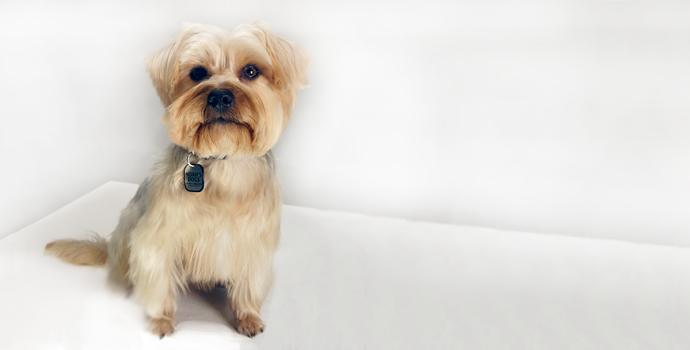
In my own words
Ay oop! Don’t be misled by my small stature, I’m a true Northerner. Just because people like to call my kind “Yorkie” don’t mean I’m all sweet and gooey like the chocolate bar! I can stand up for meself, don’t you worry.
If the truth be known, I’m just a big dog in a little body. I like my walks (don’t say “walkies” to me, it makes me cringe!), I like learning tricks, and if you fancy taking me to the dog show, I’ll do you proud, because I reckon I’ve got the most beautiful coat of all the dogs, (except perhaps them snobby Afghans).
Some people say I’m snappy and yappy, but if I like my human, and they treat me with respect, I will be obedient and kind and respect them back, but spoil me or treat me like one of them ‘andbag dogs and I can turn you know. Having said that, I do make a good guard dog ‘cos I’ve got a big voice for me size.
When all’s said and done, all I really really want is an owner who’ll treat me like the proper dog I really am. Fancy a walk on Ilkley Moor? I can show you where all the rat ‘oles are ...
My ideal owner(s)
Singles
Families with older children
Active people
What they say about me
Small and cuddly (if you must!)
Dainty and refined
Feisty
Lots of energy
Fearless
Please read on, and find out more about me, though I know you’ll find me quite irresistible, and see if I will be someone you can be happy with for the next 15 years!
Is this Yorkshire Terrier for you?
Test your knowledge about the Yorkshire Terrier
Information essential about the Yorkshire Terrier
Kennel Club Group:
Toy
Size: Small: Height 6 – 9” (15 – 19 cms), weight 3 – 7lbs (1.5 – 4 kg).
Popularity:
Breed History:
The Yorkshire Terrier is a pure British breed, developed during the 19th Century to catch rats in the Yorkshire and Lancashire cotton and wool mills. The foundation breeds were probably the Paisley Terrier and the Skye Terrier which were brought to Northern England by Scottish immigrants looking for work in the mills. The Maltese Terrier is another possible addition to the early mix. The breed’s nickname, Yorkie, is now used more than its original name. Although placed under the Toy Terrier section of most kennel clubs, it is generally accepted that the Yorkie is a true Terrier. Yorkies make great companions, having a huge personality for their size, great character, and charming good looks. They are also very active little dogs, and like nothing better than a good walk of about 30 minutes, lots of play time and a few ratting sessions too.
Character:
He may be classified as a Toy dog, but your Yorkie is anything but. He is a Terrier through and through. Very playful, active and alert, especially when young, Yorkies have a good sense of humour and are courageous enough to want to play with the biggest dogs in the park. Being small, they can overdo it, and appreciate some quiet time each day to recharge their batteries. They are trainable to a good level, but can be stubborn. “I Did It My Way” should be on every Yorkie’s memorial!
Temperament:
Full of pride and self importance, with an upright bearing, your Yorkie loves to be noticed. However, don’t make the mistake of thinking he’s a lap dog – he isn’t! He may like to cuddle up on the sofa with you, but if he feels you are under threat, or there’s a stranger outside, he’ll turn into an instant guard dog. Yorkies do bark a lot, which can be useful at times, but they can become over-protective, so thorough early training and socialisation will stop this becoming a problem. Though intelligent and capable of learning a wide range of skills, it is in a Yorkie’s genes to be independent and not rely on human guidance, so you must be prepared to put lots of time and patience into their training. Your reward will be a faithful, entertaining little friend who exudes charm and character.
Conformation:
Yorkies should have an upright carriage with a “look at me” presence about them. The head should be small and flat, not too round in the skull, not too long in the muzzle. The nose should be black. The mouth should have a perfect scissor bite with well spaced teeth. The eyes should be medium sized, dark and sparkling with sharp intelligence. The ears should be v-shaped and erect. The neck should have a good reach, shoulders should be well laid with straight front legs well covered with hair. The body should be compact with a level back leading to a medium length tail with plenty of hair, carried level with the back. Hind quarters should be strong, and hind legs straight when viewed from behind.
Although tough little dogs, Yorkies have very delicate bones, and many have been injured or even killed in falls, in boisterous games with other dogs or owner’s clumsiness.
Coat
The ideal Yorkie coat should be of medium length, silky and straight. One advantage is that it does not shed, except at bath-time. The hair being so fine, it needs daily grooming to avoid tangles and knots. Some Yorkies, usually those of unconventional colour, can have woolly or cottony coats, but these need just as much attention.
Colour:
The standard colours, recognised by the UK Kennel Club are black and tan, black blue and tan, blue and tan, and blue steel and tan. Colours not recognised by the KC look similar, but are referred to as steel blue, steel blue, steel blue and black or steel grey. The ideal is always that the darker colour does not mingle with the tan to blur the outline, and that the tan is a deep, rich colour at the ends of the hair, fading back to a paler colour towards the body. Yorkies do come in other colours, and coats can vary too, but beware of falling for a dog with a very woolly or cottony coat, because it could mean there are genetic defects leading to poor health.
Training:
Yorkies are independent! Always remember they are true terriers, and it is in their genes to work on their own without help from humans. However, with lots of patience and repetitions, they can learn many skills. Socialisation with people and other dogs is important right from puppyhood, because Yorkies can be overprotective of their owners which can make them aggressive and bark too much. If your Yorkie’s barking becomes a nuisance, the best policy is to carry on with what you are doing, and don’t react at all. He will eventually realise he was wasting a good bark on nothing!
Care:
If you intend your Yorkie to be simply a companion, it might be easier to keep the coat, ears and feet trimmed fairly short. Despite the fact that Yorkies do not shed their coats nearly as much as other breeds, which gives them the reputation of being hypoallergenic*, they still need daily brushing and regular baths. If you want to show your Yorkie, the coat should be trimmed to floor length to allow ease of movement. However, the traditional long coat is extremely high maintenance, and care can become a full time job, involving oiling the coat and wrapping it, as the hair is so fine it easily breaks.
*More often than not, it is the dander (scurf) and saliva which causes asthma in sensitive people. Equally, sufferers can be immune to certain breeds, and not to others.
Health:
Most Yorkies can live a long, healthy life of up to 17 years, but a number of health issues can affect them. If you are buying a puppy, it is important to check with the breeder if tests have been done for any genetic defects, and if not, have them done before you buy. Yorkies are prone to chest infections such as bronchitis, can suffer allergic skin reactions to injections, or other skin allergies. Vets know that Yorkies sometimes have a poor tolerance to anaesthetic, so will be especially careful.
Like many small breeds with small jaws, severe dental problems can arise, but can be avoided by regular dental checks by your vet, and regular brushing with toothpaste for dogs. Don’t use human toothpaste as it is too frothy and can be swallowed. Eye problems such as in-growing eyelashes can also occur, and skeletal diseases can also arise. Cushings Syndrome is common in older dogs, as well as Cushings-related Tracheal Collapse which produces a honking cough. This can also be caused by too much pulling on the lead, so it is always advisable to use a dog harness rather than a collar. Puppies, and occasionally mature dogs, can suffer low blood sugar (hypoglycaemia) if left too long between meals. Yorkies, like a lot of small breeds, can be fussy eaters. A little and often of something he likes is the best policy. If you do your homework, making sure that your little Yorkie’s bloodline is healthy and strong, so should he be. Your Yorkie should give you many years of good company and lots of laughter.
You may also like:
Yorkshire Terriers looking for a home in UK »




Yorkshire Terriers and their owners »


If you like Yorkshire Terriers, you may be interested in breeds of the same size »
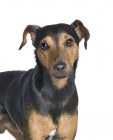

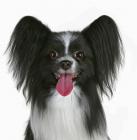
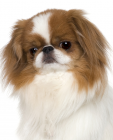

If you like Yorkshire Terriers, you may like other breeds with similar characteristics »
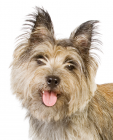
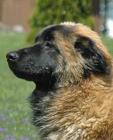
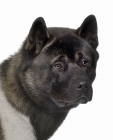

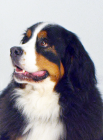
If you like Yorkshire Terriers, you may be interested in these other toy dogs »
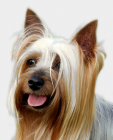
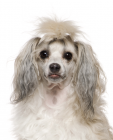


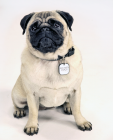
Advice on choosing your breed »
Find an animal shelter or rescue home where a Yorkshire Terrier is waiting for a new home »
The following grid gives a fast track review which covers all breeds. You can apply it to help you decide if a Yorkie is suitable for you, the environment where you live, your personality and your lifestyle. On the grid, 1= strongly disagree, and 5= strongly agree. For example, if you are looking for a dog that likes to swim, look down the list under Activities, and you will see that Yorkies are not great swimmers, scoring 2. If you want a playful companion, look down the same list, and you will see that Yorkies are full of fun, and score 5. You might like to save or print off this section and keep it for reference while you check some other breeds before making your final choice.
Add your own ratings on this breed »
|
*PLEASE NOTE: All our breed profiles are general, and all dogs are individuals. Always talk to the breeders and meet the owners you are buying from. Try to meet the dog and its parents if it is a puppy in their home environment.








